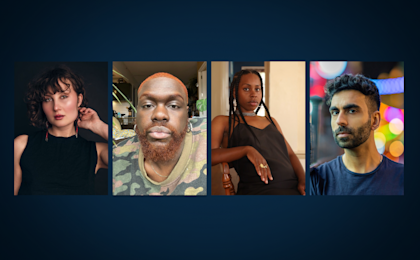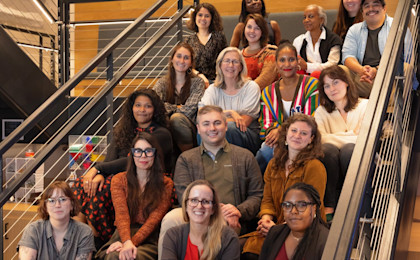AudibleLAB Opens Doors For the Next Generation of Storytellers in Spain

Andrea Salvatierra was a student at the Universidad Politécnica in Valencia, Spain, when an advisor told her about the AudibleLAB program. Salvatierra’s grandmother is Colombian, and she and her classmate Silvia Nunes had both been there, investigating the war and how sexual violence had been used to manipulate and terrorize women into abandoning their lands—and into leaving them quietly. They knew this was a story they wanted to tell in order to raise awareness and give a voice to the survivors, but they couldn’t tell it on their own. With the help of AudibleLAB’s workshops and mentoring, Salvatierra and Nunes teamed up with classmates Eva María Román, Adrián Juarez and Mar Tarragó to put together a comprehensive proposal for Silencio Armado, an immersive series focused on the experiences of eight women who are survivors of Colombia’s half century of guerilla warfare.
More than a dozen people across Audible who work on our services for US, Spanish and German listeners came together to launch AudibleLAB in 2023 “in order to give young people access to our knowledge and cutting-edge technology,” says Arantxa Zunzunegui, a senior producer at Audible. In a series of workshops at universities throughout Spain, students learned about the groundbreaking world of audio storytelling, and how to pitch a podcast and produce a high-quality pilot episode. The finalists would have their pilots released on Audible’s service for Spain, and the winning project would receive a scholarship for development and production of a whole series.
Says Juan Baixeras, Audible’s country manager for Spain and Italy, who participated in many of the workshops, “With AudibleLAB, we wanted to give young journalists a powerful new way to tell stories that the world needs to hear, and to bring exciting, fresh voices into the audio space.”
The AudibleLAB team enlisted the help of Chuse Fernández, an award-winning producer who assisted in designing the program’s workshops and in judging the students’ projects. Fernández’s approach was to “get the students to think big” about ways they could use audio to engage the listener. “These students have explosive imaginations and want to change the world. It’s good for society if we help them revolutionize it with their creativity.”
Audible held workshops at seven of Spain’s leading universities for a total of 220 students, who divided into 50 different groups to create projects. Fernández led the students through every aspect of podcast production, from ideation and pitching to scriptwriting and recording to post-production and marketing. Ana Ramirez, a casting and production lead for Audible’s Spanish content team, taught the students about producing professional audio, including the use of cutting-edge technologies like Dolby Atmos and binaural recording. She even gave them tips on clothing materials to avoid while recording—nothing that makes a sound. “The idea was to present the challenges someone in audio production will face day to day,” Ramirez explains.

In the end, 20 of the student teams submitted projects for consideration; five made the finals and had their pilots released on Audible, with Silencio Armado produced in its entirety as an Audible Original. “From the moment I listened to the pilot, I was completely hooked, I wanted to know more,” says Ramirez. In the pilot episode, a woman named Maricel tells the harrowing story of being kidnapped and sexually assaulted by members of the dissident group, National Liberation Army (ELN), and how she and other women from her neighborhood created the Association of Afro-descendant Women of the Pacific. In each subsequent episode, a different woman tells her story and describes her part in the movement to fight back and help other victims.
To produce the nine-episode series, the team worked with Madrid’s Blueberry Studios, with whom Audible has collaborated to produce content, in an experience Salvatierra says was “incredible” and eye-opening. Fernández is glad that the students and universities seem excited about the possibilities of audio. “There’s a ‘before AudibleLAB’ and ‘after AudibleLAB’” for the participants, he says. “We introduced them to thinking about journalism in terms of audio, not just visual.” And the success of AudibleLAB has encouraged the Audible team to start planning a second edition in Spain.
The creators of Silencio Armado are optimistic about their professional futures after AudibleLAB. “We never thought something like this was possible, because Audible is the top of the top,” says Salvatierra. “We felt blessed to have this opportunity, that Audible chose our project and this story.” She says she’s also hopeful about progress for Colombia’s women. “There are people there working for peace, and to repair what has been destroyed by the conflict.” Perhaps, she hopes, the series will find other victims in Colombia, and around the world, and let them know they are not alone.
“Silencio Armado is a powerful testimony to Colombian women,” adds Ramirez. “I feel proud that Audible was able to help this story reach a broader audience.”


